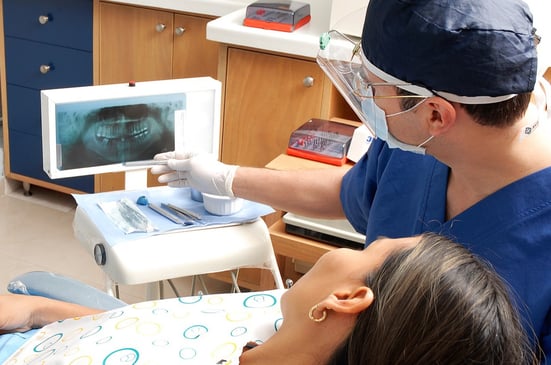3 reasons dentists discontinue their outsourced dental insurance billing services


You’ve been working with an outsourced dental billing company, and you’re feeling that you’d like to go back to using someone in-house to handle insurance billing. You’re stressed because you’re caught between a rock and a hard place. Do you cut the billing company loose and hand over your billing to your office manager? Or are you wanting to hire an in-house insurance coordinator?
We’re going to be super honest here. This happens with our customers at Dental ClaimSupport sometimes, and we usually try to talk through the decision-making process with dentists when they bring us this concern. Through the years as a dental billing company, we’ve seen practices feel that this is what’s right for them and we always try to explain the risks of this.
In this article, you will learn about the risks of returning to in-house billing after having had an outsourced dental billing company take care of billing for you and 3 missteps dentists make when hiring in-house team members.
What are 3 common reasons dentists leave a dental billing company?
There are a few reasons we’ve seen practices choose to bring their billing back to an in-house employee. Typically, these kinds of questions begin to arise after around 2 years of working with an outsourced billing company.
1. The office manager has offered to take over insurance billing in exchange for a raise
This is probably the most common reason we see. The office manager tells the doctor to let them handle the billing, give them a raise and let go of the dental billing company. Hey, we can’t blame them for negotiating where they can.
However, handling billing is a full-time job, and as an office manager, they already have so many responsibilities. Running a dental office is no joke, and taking the time to create, batch and send claims with attachments- as well as work the aging report can take all day depending on how many patients you are seeing each day. Oh, and don’t forget the daily posting of insurance checks and EFTs.
Dental billing requires full attention, and you have to ask yourself the question: does your office manager really have the time or the skill to handle that?
For reference, a $2 raise is about $4,000+ per year, not including taxes or benefits.
A $5 raise increases a salary by more than $10,000+ per year.
Giving a raise without proven (insurance) ability is a risk. Giving a raise also sets a precedent. That raise will likely never be taken away, even if the insurance skill and ability was not as expected.
Giving more duties to your office manager will be a detriment to your business. Without working overtime every single week, there is not enough time in the day for an office manager to handle all of their normal duties plus the added dental insurance and billing tasks. Here is a list of things an office manager might already be handling on a day to day basis (not including dental insurance):
- Practice Management & HR
- Patient scheduling, treatment planning & setting up payment plans
- Working recall lists
- Recruiting, Hiring (& firing), Onboarding of employees
- Training of new staff members
- Employee supervision of assistants, hygienists, dentists, and office administration staff
- Timeclocks, overtime, vacations
- Payroll - maintaining legal HR protocols
- eVerify, taxes, deductions
- Employee evaluations
- Benefits Management - Medical insurance, dental insurance, vision insurance, 401k, unemployment claims
- Financial
- Managing Cash Flow
- Daily reporting - software reporting
- Accounting - P&L, Balance Sheet
- Maintain all vendor relations
- Accounts Payables
- Accounts Receivable
- Marketing
- Patient experience
- Advertising
From the list above, office managers have substantial “business” responsibilities for your practice to run smoothly. And don’t get us wrong, office managers are the backbone of a dental practice.
If you continue to increase their workload, however, by adding more responsibilities, such as dental insurance and billing, all other areas of your business will experience a decline.

2. Dentists want to save their dental practice some money
Obviously hiring anyone costs money. It’s something that needs to fit into your monthly budget, however dental billing companies aren’t just a monthly expense. They’re like an extension of your dental administrative team that works behind the scenes taking care of certain things so that you don’t have to even think about it. We think of it as an investment for your dental practice. The return? Collecting a lot more money than you would without it.
If you really want to break down the money, a typical, quality dental billing company is going to cost around an average of $1,500-$1,600 per month. Hiring someone in-house to take care of your billing? Well, that’s someone’s salary and livelihood. Needless to say, it’s going to cost you a lot more $1,500-$1,600.
The average in-house dental insurance coordinator makes around $18.26 per hour, or $45,000-$55,000 annually. Compare that to an average outsourced dental billing company annual expense being less than $20,000.
3. The dental practice just needed someone to clean up their insurance aging report
We often have offices coming to us with a messy, long aging report, hoping for someone to clean it up for them. These unpaid claims need to be followed-up on and any denials need to be tracked. Don’t get us wrong, as dental billers, we love cleaning up old insurance aging reports and getting insurance checks for the office.
The extensive aging reports didn’t happen overnight. The previous process, or the lack thereof, contributed to the tens of hundreds of claims we often find in a cleanup.
But once the dental billing company cleaned up the accounts receivables and the aging report is more manageable, the dental practice decides to go back to their original way.
The closest thing we can compare it to is exercising. You start working out, you go on for two weeks and you’re feeling amazing. It might occur to you, “Well that fixed me! I feel better now.” As most of us know, exercising is supposed to be a part of your regular lifestyle in order to keep your mind and body healthy. It’s not a quick fix, it’s something you stick with to maintain your health.
The billing company took over your billing because your previous process was not working. The dental billers are professionals and experts that dedicate their time to your insurance process, to allow your in-house staff to focus on what’s most important in your office: your patients.
What 3 missteps do dentists make in hiring in-house staff members to handle insurance billing?
First off, what was once handled by an expert in billing is now going to be handled by someone, likely less skilled, in-house. Maybe you’ve already hired an insurance coordinator. The problem is most dentists hire insurance coordinator’s from other dental practices without doing these 3 things:
1. Not asking their previous employer for employment verification or a recommendation
Without asking for a previous employer recommendation, you don’t know why this amazing insurance coordinator left their previous dental office. Many times resumes do not tell the story with the real reasons one left another position.
In hiring, you should be doing some due diligence to find out how the employee was in their previous position. Call the previous office to verify employment, and if possible, if they would hire them again.
2. Not verifying their insurance skill level with an ability quiz or test
Not verifying the insurance skill level is one of the most common reasons offices come back to dental billing companies. They thought they hired an all star based on the insurance coordinator resume, but they never asked pointed questions to validate the skill level of the new hire.
As the business owner, do you know the insurance and dental billing specific questions in which to ask? If you know the questions, can you then decipher if the answers are actually correct?
Let us help you out here with one simple example question to ask your in-house insurance coordinator in an interview:
“Can you please explain the birthday rule?”
The answer you may receive is “whichever parent’s birthday is first.”
The actual correct answer is
“the biological parent whose birthday is first IN THE CALENDAR. The year of birth is irrelevant.”
Then you could also ask the question of how did they acquire their insurance skills? The answer you do not want to hear next is: "Self taught" or "on the job training."
Unfortunately, in the dental world, most are self taught or learned from a previous employee in their dental practice. It is very common that most insurance coordinators have not had any type of formal dental billing education or any continuing education.
One of the worse forms of information your employees can get is from Facebook groups. "Learning" from Facebook groups is not a form of education. These groups have become inundated with false information in the Comments sections.
Dental Claims Academy was designed to help dentists train their employees on
dental billing & coding education.
3. Assuming a dental software will be easy to learn without proper training
Dental software are all similar in nature, but much different in ledgers and insurance administration -- as well as differing clearinghouses and attachment software. Whether the person has experience in Opendental, Eaglesoft, and Dentrix -- software experience must be taken into account before a decision is made.
As the dentist, you are not going to be spending your working hours training, nor should you be, on your dental software for an insurance coordinator. And even if you were training them, are you the right person to be training someone on your software and dental billing?
Is your office manager the best person to be training them on dental billing as well? Have they been fully educated & trained on the software, and dental insurance billing? If not, you should consider a professional trainer - for both the software and a dental billing process.

Outsourcing versus in-house dental billing: Should I stay or should I go?
Outsourcing may not be for you, but you likely prefer higher collection numbers, and less overhead.
Before you decide to let go of your dental billing company, do your due diligence
There are a few things you can do to make sure you’re making the right choice to best benefit your dental practice.
Evaluate your collection numbers with your dental billing company
Calculate your collections percentage and take a look at your aging report numbers. What were they before you hired the billing company? Compare these numbers before you make that decision.
Vet whoever you are hiring or promoting
Don’t hire just anyone to handle your insurance billing. You need someone who knows what they’re doing, has years of quality experience, and some good references.
We’ve seen offices blindly accept that someone can handle the billing, no questions asked. Unfortunately what ends up happening, is this person doesn’t really have much experience with insurance billing and is scared to ask for help.
Evaluate this person’s performance as your insurance coordinator at 30/60/90 days
It’s your job as the dentist and practice owner to make sure all of your employees do their job well. Evaluate the performances of the people you work with to make sure the position you’ve filled is being optimized to make your dental practice as profitable as possible.
Lean on Dental ClaimSupport when making decisions about your practice
We have had many practices come to us after letting us go, telling us they made a mistake in hiring an unqualified in-house insurance coordinator.
We know it's hard for anyone to admit they made a mistake. And whatever reason you decide to come back is up to you.
If you are unhappy with your current situation, we can help. Schedule a call to discuss your options. We can help you to make the right switch.
Related Posts
Dental revenue resources from Dental Claim Support

